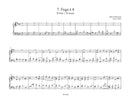| タイトル | Easy organ pieces from the 19th century, volume 3 |
| 出版社 | Bärenreiter・ベーレンライター |
| 楽器編成 | Organ |
| 楽器編成(詳細) | Org |
| 品番 | 9790006520305 |
| 校訂者 | Martin Weyer |
| 形状 | V, 61 ページ・24.0 x 30.4 cm・259 g・Stapled |
| 出版番号 | BA 8420 |
| ISMN | 979-0006520305 |
Volume 3 in our series of easy nineteenth-century organ music provides semi-professional organists with another collection of short one or two manual organ pieces. The editor Martin Weyer , an organist regarded as an authority on nineteenth-century organ music, has limited his selection to works that combine solid craftsmanship with ease of performance.
In essence, volume 3 follows the editorial principles of its two predecessors while increasing the number of truly easy pieces. Among the composers represented is the Dutchman Johannes Barend Litzau (1822–1893), whose Preludes op. 13 and 17 are simple yet elegant works for beginners. The Czech composer Johann Beranek (1813–1885), on the other hand, was more concerned with counterpoint; his Ten Fugues appear here for the first time with detailed analyses to underscore the volume’s “learned” slant. Carl Gottlieb Umbreit (1763–1829) and his colleague Michael Gotthard Fischer (1773–1829) stand at the borderline between a galant organ style derived from Kittel and the early romantic age. Another composer who took part in this subtle stylistic evolution was Johann Christian Heinrich Rinck .
The brevity of the compositions makes them perfectly suitable for use as preludes and postludes in church services of all denominations. The volume contains detailed comments on performance practice and a list of sources.
- Technically easy romantic literature
- Also playable on smaller instruments
- Short pieces well suited for use in church services
- Notes on performance practice
Music of Johannes Barend Litzau (1822-1893), Johann Beranek (1813-1885), Carl Gottlieb Umbreit (1763-1829) and Michael Gotthard Fischer (1773-1829)





